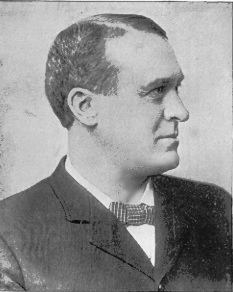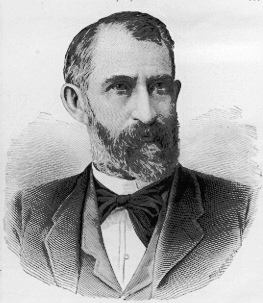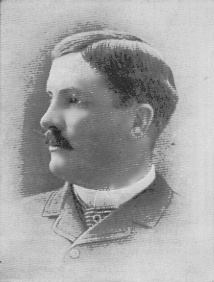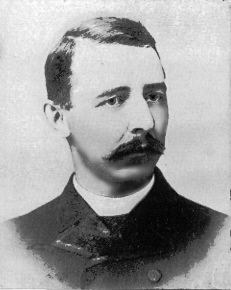|
OMAHA
ILLUSTRATED.
occupies. Mr. Kimball is a very thorough and systematic
railroad man. He is master of every detail and in the
science of railroading, especially from a commercial
standpoint, he has but few equals in this country. His long
connection with the Union Pacific attests the high esteem in
which his services are held. Mr. Kimball was married in 1854
to Mary P. Rogers, daughter of Nathaniel P. Rogers, Esq., of
New Hampshire. They have four children. The eldest daughter,
Francis, is the wife of George W. Holdrege, general manager
of the Burlington and Missouri River Railroad in Nebraska;
the second daughter, Arabel, resides with her parents;
Thomas R., is a graduate of the Massachusetts, School of
Technology in the architectural class of 1887, and is now in
Boston engaged in his profession. The youngest son, Richard
R., is a student in
Boston.]
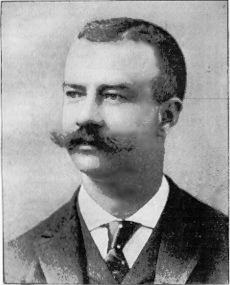
J. S. TEBBETS, GEN'L P. & T.
AGT. U. P. RY.
|
[J.
S. Tebbets the general passenger and ticket agent
of the Union Pacific railway, is the son of a
Unitarian clergyman, and was born in Medford,
Mass., on the 4th day of July, 1858. He was
educated in the Latin school, Boston, and in
Harvard University, graduating from that
institution in the summer of 1880. He first entered
railroad service as a truckman in the local freight
depot of the Boston and Albany railroad at Boston
on the 22d of November, 1880. There he worked for a
number of months, being finally put in charge of
the export business of the road which came from the
West. He entered the general offices of the same
road in a minor capacity on the 1st of September,
1881. Two years later he was made chief clerk of
the general freight department of the road. In
April, 1884, he went to East Albany, New York, to
organize and take charge of the joint transfer
freight house of the Boston and Albatty and New
York Central roads. On the 1st of October, 1884 he
came West and entered the general freight office of
the Union Pacific railway in this city, and from
that, dates a remarkably successful career in the
railway world, promotion following promotion until
now he is at the head of the passenger department
of the great railroad whose service he entered
three years ago as a clerk March 1, 1885, he was
appointed division freight agent of the road, with
headquarters at Salt Lake City. January 1, 1886, he
was appointed assistant general freight agent, with
headquarters at Kansas City. On the 1st of
September, 1887, the Potter management called him
to the head of the general passenger department,
the onerous duties of which position he is still
discharging with efficiency. Mr. Tebbets is a
striking example of what a young man with brains
and energy can accomplish. No man of his years
ranks higher in the railroad world, and few, if
any, have achieved such extraordinary distinction
in so limited a time.]
|
|
|
|
|
[E. L. Lomax,
the assistant general passenger and ticket agent of
the Union Pacific railway, was born in
Fredricksburg, Virginia, on the 25th of February,
1852. He was educated at Columbia University, in
that state, taking a full course in civil and
mining engineering. When seventeen years of age he
entered the United States engineer corps under
General J. H. Wilson, then in command of the
department of the Northwest, with headquarters at
Keokuk, Iowa. In 1870 he entered railway service as
local ticket clerk at Burlington, Iowa, of the
Burlington & Missouri railroad, under A. E.
Touzalin, then the general passenger and ticket
agent of the road. In 1872 he entered the general
offices of the Central Iowa railroad at
Marshalltown, and two years later went to the St.
Louis and Southeastern railroad as assistant to the
general freight and passenger agent, with
headquarters at St. Louis. He was soon promoted to
the position of assistant general passenger agent,
a position he held until 1879 when he accepted a
like position with a larger corporation, the St.
Louis, Iron Mountain and Southwestern railroad. In
1881 he was appointed general passenger and ticket
agent of the Toledo, Cincinnati and St. Louis road
with headquarters at Toledo, Ohio. Shortly
afterward he went to the Chicago, Burlington and
Quincy road as chief clerk of the local service,
under Percival Lowell, at Chicago. Later he became
the chief clerk of the foreign service, and in 1884
was made assistant general passenger agent, which
position he resigned in September, 1887, to accept
the position of assistant general passenger and
ticket agent of the Union Pacific railway under J.
S. Tebbets and the Potter management of that road.
Mr. Lomax has had an extensive railroad experience,
serving in almost every capacity in both the
freight and passenger departments. He is an
efficient and capable man and a popular gentleman
as well, who will be heard of in yet higher circles
of the railroad world.]
|
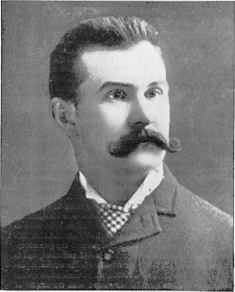
E. L. LOMAX, ASS'T GEN'L P.
& T. AGT. U. P. RY.
|
[113]
|
